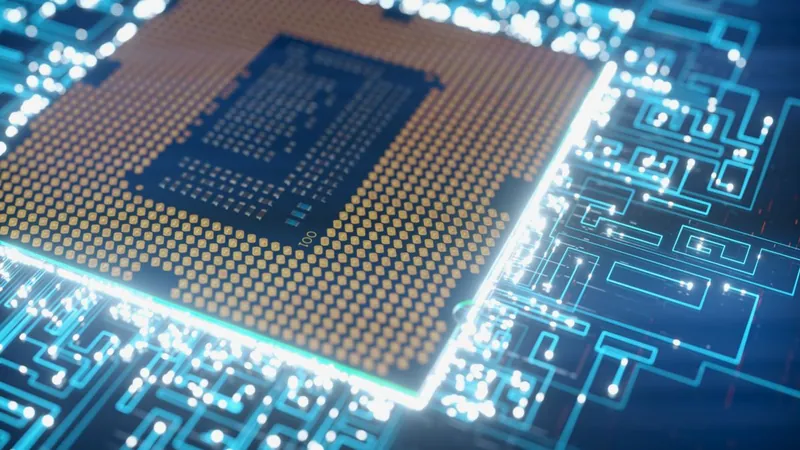
D-Wave Unveils Revolutionary 4,400-Qubit Quantum Processor: A Game-Changer in Computing Power!
2024-11-18
Author: Yu
D-Wave Systems Launches Advantage2 Processor
D-Wave Systems has made a monumental leap in quantum computing with the launch of its latest processor, the Advantage2, boasting over 4,400 qubits and claiming to be a staggering 25,000 times faster than its previous model. This innovation marks a significant advancement in quantum technology, opening new avenues for complex applications such as artificial intelligence, materials science, and optimization tasks.
Performance Improvements Compared to Previous Models
In a statement released on November 6, D-Wave highlighted the remarkable performance improvements achieved with the Advantage2 quantum processing unit (QPU). The company reported "substantial performance gains" compared to their earlier 5,000-qubit Advantage model, showcasing enhanced speed and accuracy in problem-solving capabilities. This leap forward positions the Advantage2 as a powerful tool for researchers and industries alike.
Complex Problem Solving in Materials Science
The processor excels in tackling intricate 3D lattice problems, which are crucial in materials science for simulating atomic interactions. Faster processing times mean that researchers can accelerate their simulations, enabling quicker development and testing of new materials. This could vastly improve sectors ranging from electronics to pharmaceuticals, where new materials can take years to develop under traditional methods.
Improved Performance in Boolean Satisfiability Problems
Additionally, D-Wave's Advantage2 significantly outperforms its predecessor in solving Boolean satisfiability (SAT) problems. This benchmark assesses a system's capability to navigate complex decision-making challenges—vital for applications in cryptography and logistics, where prompt and accurate solutions are essential. The Advantage2 completed these SAT problems with five times greater accuracy, underscoring its versatility across diverse quantum applications.
Key Enhancements in Qubit Technology
The latest processor brings key enhancements in three critical areas: coherence time, energy scale, and qubit connectivity. Coherence time, which indicates how long qubits can maintain their quantum state before losing information, has been doubled in the Advantage2. Longer coherence times lead to more stable calculations, significantly improving the reliability of quantum computations.
Increased Energy Scale and Qubit Connectivity
Moreover, the Advantage2 features a 40% increase in energy scale, which allows the processor to manage more complex calculations with enhanced stability. This improvement ensures that the system can handle a wider variety of applications without running into limitations typically faced by previous generations of quantum processors.
Enhanced Interaction Among Qubits
In an exciting development, qubit connectivity—representing how many other qubits a single qubit can interact with—has jumped from 15-way to an impressive 20-way connection. This upgrade allows the Advantage2 to tackle larger and more complex problems than ever before, potentially revolutionizing fields that require advanced quantum solutions.
Excitement from D-Wave's Leadership
Trevor Lanting, Chief Development Officer at D-Wave, expressed his excitement about the capabilities of the new processor. He stated, "Our strategic focus on enhancing the connectivity and coherence of our quantum computing system has proven to be exceptionally successful. We're thrilled with the performance of our newly calibrated processor and are confident that this technology will provide remarkable solutions for our clients, addressing larger and more complex challenges."
The Future of Quantum Computing with D-Wave
As the race to harness the true potential of quantum computing heats up, D-Wave's Advantage2 processor stands out as a groundbreaking achievement that could redefine what's possible in the world of computational research and technology. Are we on the brink of a quantum revolution? Only time will tell!


 Brasil (PT)
Brasil (PT)
 Canada (EN)
Canada (EN)
 Chile (ES)
Chile (ES)
 España (ES)
España (ES)
 France (FR)
France (FR)
 Hong Kong (EN)
Hong Kong (EN)
 Italia (IT)
Italia (IT)
 日本 (JA)
日本 (JA)
 Magyarország (HU)
Magyarország (HU)
 Norge (NO)
Norge (NO)
 Polska (PL)
Polska (PL)
 Schweiz (DE)
Schweiz (DE)
 Singapore (EN)
Singapore (EN)
 Sverige (SV)
Sverige (SV)
 Suomi (FI)
Suomi (FI)
 Türkiye (TR)
Türkiye (TR)